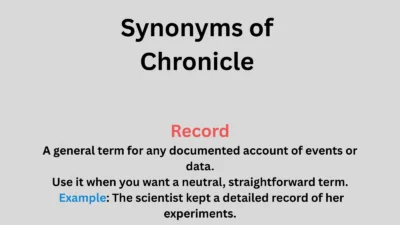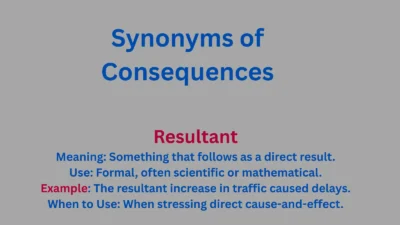Synonyms of Terrain are valuable tools in writing when you’re describing different landscapes or analyzing the features of any terrain type. Whether you’re crafting a travel blog, a military report, or a real estate listing, choosing the right word can make your description more precise and vivid. This article explores a broad range of synonyms that help elevate your content across various contexts—from the metaphorical to the physical ground beneath your feet.
A skilled reader can appreciate how each term changes the scene, whether it’s a flat desert or a rugged, rolling hill. These alternatives offer a deeper understanding of geography, topography, and geographical settings by adding color and clarity.
Use them to inject life into your piece, expand your vocabulary, and adapt to any strategy or purpose. Each guide to terrain synonyms not only helps with useful substitutions but also sharpens your overall writing skill.
What Does Terrain Mean?
At its core, terrain means the physical characteristics of a tract of land. It encompasses:
- Topography: hills, valleys, plains, cliffs
- Surface conditions: rocky, sandy, muddy, smooth
- Usability: whether the land is easy or hard to travel on
Terrain often implies something natural and outdoor-related. It can carry a tone of challenge or complexity, especially in contexts like hiking, military strategy, or construction.
Synonyms of Terrain: Meanings, Usage & Examples
1. Land
- Meaning: The solid part of the earth’s surface.
- Use: General, everyday word; broad and neutral.
- Example: The farmer owned acres of fertile land.
- When to Use: When speaking simply about property or ground without emphasizing features.
2. Ground
- Meaning: The surface of the earth.
- Use: Often used to mean the immediate surface beneath you.
- Example: The children played on the muddy ground.
- When to Use: For immediate, local surfaces, often informal.
3. Landscape
- Meaning: A visible expanse of land, often viewed aesthetically.
- Use: Focuses on appearance, often scenic.
- Example: The artist painted the rolling hills of the landscape.
- When to Use: When highlighting visual or artistic aspects.
4. Topography
- Meaning: The arrangement of natural and artificial physical features.
- Use: Technical, often scientific.
- Example: The topography of the region is mountainous.
- When to Use: In detailed geographic or scientific contexts.
5. Region
- Meaning: A broad area distinguished by similar features.
- Use: Larger scale than terrain, less about physical form, more about area.
- Example: The desert region stretches for miles.
- When to Use: When referring to large areas or zones.
6. Terrain Type
- Meaning: Classification of terrain based on features.
- Use: Specific to categorizing landforms.
- Example: The terrain type here is rocky and uneven.
- When to Use: When describing or classifying physical land.
7. Zone
- Meaning: An area distinguished by certain characteristics.
- Use: Often implies functional or ecological divisions.
- Example: The wetland zone is rich in biodiversity.
- When to Use: For ecological or functional areas.
8. Earth
- Meaning: The material the ground is made of.
- Use: More elemental, sometimes poetic.
- Example: He dug deep into the earth.
- When to Use: When focusing on soil or the planet’s surface.
9. Field
- Meaning: An open area of land, often flat and used for farming.
- Use: Agricultural or open space.
- Example: The sheep grazed in the green field.
- When to Use: When referring to farmland or open grassy areas.
10. Plain
- Meaning: A large area of flat land with few trees.
- Use: Emphasizes flatness and openness.
- Example: The vast plain stretched beyond the horizon.
- When to Use: When the flatness of the land is key.
11. Plateau
- Meaning: An elevated flat area.
- Use: Geological term implying height.
- Example: The city sits on a high plateau.
- When to Use: When emphasizing elevation combined with flatness.
12. Slope
- Meaning: The inclined surface of land.
- Use: Focuses on the angle or steepness.
- Example: The hikers struggled up the steep slope.
- When to Use: When describing inclined surfaces.
13. Hill
- Meaning: A naturally raised area of land, smaller than a mountain.
- Use: Emphasizes moderate elevation.
- Example: The cottage was built atop a gentle hill.
- When to Use: When small elevations are the focus.
14. Mountain
- Meaning: A large natural elevation of the earth’s surface.
- Use: Emphasizes height and ruggedness.
- Example: The mountain terrain made the journey difficult.
- When to Use: For dramatic, rugged landscapes.
15. Valley
- Meaning: A low area between hills or mountains.
- Use: Emphasizes depression or low elevation.
- Example: The river flowed through the lush valley.
- When to Use: When highlighting a dip or hollow.
16. Forest
- Meaning: A large area covered chiefly with trees.
- Use: Implies dense vegetation.
- Example: The dense forest terrain hid many secrets.
- When to Use: When vegetation is prominent.
17. Wilderness
- Meaning: An uncultivated, uninhabited region.
- Use: Suggests wild, natural, often untouched land.
- Example: The explorers ventured into the wilderness.
- When to Use: For rugged, untamed areas.
18. Backcountry
- Meaning: Remote, undeveloped rural area.
- Use: Implies isolation and roughness.
- Example: Hunters prefer the backcountry for solitude.
- When to Use: For remote, less accessible terrain.
19. Badlands
- Meaning: Dry terrain with steep slopes and little vegetation.
- Use: Describes harsh, eroded land.
- Example: The badlands are known for their strange formations.
- When to Use: For dramatic, barren landscapes.
20. Terrain Features
- Meaning: Specific parts or characteristics of terrain.
- Use: Technical, used in mapping or military contexts.
- Example: The terrain features include ridges and ravines.
- When to Use: When analyzing or describing details.
21. Dune
- Meaning: A mound of sand shaped by the wind.
- Use: Specific to sandy desert or coastal terrain.
- Example: The dunes shifted after the storm.
- When to Use: When describing sandy landscapes.
22. Terrain Surface
- Meaning: The topmost layer or condition of terrain.
- Use: Emphasizes the texture or quality of the land.
- Example: The terrain surface was slippery with ice.
- When to Use: For describing immediate ground conditions.
23. Groundscape
- Meaning: The visible features of the land surface.
- Use: Artistic or descriptive term.
- Example: The groundscape was dotted with wildflowers.
- When to Use: For poetic or detailed description.
24. Expanse
- Meaning: A wide, continuous area of land.
- Use: Emphasizes vastness.
- Example: The desert expanse seemed endless.
- When to Use: When highlighting large, open areas.
25. Continent
- Meaning: One of the major landmasses.
- Use: Very broad, large scale.
- Example: The terrain of the continent varies widely.
- When to Use: When discussing geography on a massive scale.
26. Landform
- Meaning: Natural physical features of the earth’s surface.
- Use: Scientific, emphasizes form and shape.
- Example: Mountains and valleys are common landforms.
- When to Use: When classifying natural shapes.
27. Surface
- Meaning: The outermost layer.
- Use: Neutral, can be abstract or physical.
- Example: The icy surface made walking tricky.
- When to Use: For immediate physical condition.
28. Soil
- Meaning: The upper layer of earth where plants grow.
- Use: Focuses on composition, not shape.
- Example: The soil in this terrain is rich and fertile.
- When to Use: When soil quality matters.
29. Trail
- Meaning: A path through terrain.
- Use: Emphasizes a route, not the land itself.
- Example: The trail wound through the forest terrain.
- When to Use: When focusing on travel routes.
30. Environment
- Meaning: The surroundings, including land and living things.
- Use: Broader than terrain; includes atmosphere and ecology.
- Example: The desert environment challenges all who enter.
- When to Use: When discussing land in ecological context.
How to Choose the Right Synonym Based on Tone and Context
- Casual vs. Technical: Words like land, ground, and field are casual and easy to understand, great for everyday conversation or general writing. More technical or scientific contexts call for topography, landform, or terrain features.
- Scale Matters: Use region, continent, or expanse for large areas. Hill, slope, and valley zoom in on smaller, specific features.
- Emotional Tone: Wilderness and backcountry evoke mystery and isolation; landscape and groundscape have artistic, peaceful vibes.
- Cultural Context: Some terms, like badlands or dunes, carry cultural or geographic specificity and might be preferred in certain regions.
- Writing Style: For poetic writing, earth, groundscape, or expanse add flavor, while terrain and topography suit formal or academic writing.
Conclusion: Mastering the Use of Terrain Synonyms
Expanding your vocabulary beyond terrain gives your writing precision and flair. Whether you want to convey the ruggedness of a mountain or the gentle stretch of a field, choosing the right synonym sharpens your imagery and enhances meaning.
Remember to consider:
- The scale of the area you’re describing
- The surface features you want to highlight
- The emotional tone you wish to evoke
- The context—scientific, poetic, casual, or technical
Next time you describe a landscape, pick the synonym that fits best—and watch your words come alive!




